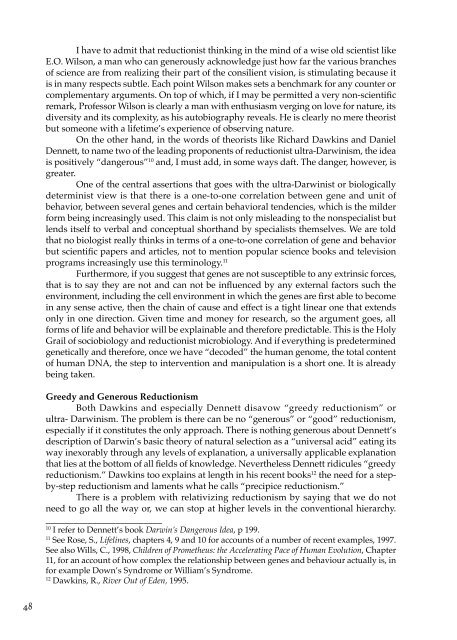The Spirit in Human Evolution - Waldorf Research Institute
The Spirit in Human Evolution - Waldorf Research Institute
The Spirit in Human Evolution - Waldorf Research Institute
You also want an ePaper? Increase the reach of your titles
YUMPU automatically turns print PDFs into web optimized ePapers that Google loves.
I have to admit that reductionist th<strong>in</strong>k<strong>in</strong>g <strong>in</strong> the m<strong>in</strong>d of a wise old scientist like<br />
E.O. Wilson, a man who can generously acknowledge just how far the various branches<br />
of science are from realiz<strong>in</strong>g their part of the consilient vision, is stimulat<strong>in</strong>g because it<br />
is <strong>in</strong> many respects subtle. Each po<strong>in</strong>t Wilson makes sets a benchmark for any counter or<br />
complementary arguments. On top of which, if I may be permitted a very non-scientific<br />
remark, Professor Wilson is clearly a man with enthusiasm verg<strong>in</strong>g on love for nature, its<br />
diversity and its complexity, as his autobiography reveals. He is clearly no mere theorist<br />
but someone with a lifetime’s experience of observ<strong>in</strong>g nature.<br />
On the other hand, <strong>in</strong> the words of theorists like Richard Dawk<strong>in</strong>s and Daniel<br />
Dennett, to name two of the lead<strong>in</strong>g proponents of reductionist ultra-Darw<strong>in</strong>ism, the idea<br />
is positively “dangerous” 10 and, I must add, <strong>in</strong> some ways daft. <strong>The</strong> danger, however, is<br />
greater.<br />
One of the central assertions that goes with the ultra-Darw<strong>in</strong>ist or biologically<br />
determ<strong>in</strong>ist view is that there is a one-to-one correlation between gene and unit of<br />
behavior, between several genes and certa<strong>in</strong> behavioral tendencies, which is the milder<br />
form be<strong>in</strong>g <strong>in</strong>creas<strong>in</strong>gly used. This claim is not only mislead<strong>in</strong>g to the nonspecialist but<br />
lends itself to verbal and conceptual shorthand by specialists themselves. We are told<br />
that no biologist really th<strong>in</strong>ks <strong>in</strong> terms of a one-to-one correlation of gene and behavior<br />
but scientific papers and articles, not to mention popular science books and television<br />
programs <strong>in</strong>creas<strong>in</strong>gly use this term<strong>in</strong>ology. 11<br />
Furthermore, if you suggest that genes are not susceptible to any extr<strong>in</strong>sic forces,<br />
that is to say they are not and can not be <strong>in</strong>fluenced by any external factors such the<br />
environment, <strong>in</strong>clud<strong>in</strong>g the cell environment <strong>in</strong> which the genes are first able to become<br />
<strong>in</strong> any sense active, then the cha<strong>in</strong> of cause and effect is a tight l<strong>in</strong>ear one that extends<br />
only <strong>in</strong> one direction. Given time and money for research, so the argument goes, all<br />
forms of life and behavior will be expla<strong>in</strong>able and therefore predictable. This is the Holy<br />
Grail of sociobiology and reductionist microbiology. And if everyth<strong>in</strong>g is predeterm<strong>in</strong>ed<br />
genetically and therefore, once we have “decoded” the human genome, the total content<br />
of human DNA, the step to <strong>in</strong>tervention and manipulation is a short one. It is already<br />
be<strong>in</strong>g taken.<br />
Greedy and Generous Reductionism<br />
Both Dawk<strong>in</strong>s and especially Dennett disavow “greedy reductionism” or<br />
ultra- Darw<strong>in</strong>ism. <strong>The</strong> problem is there can be no “generous” or “good” reductionism,<br />
especially if it constitutes the only approach. <strong>The</strong>re is noth<strong>in</strong>g generous about Dennett’s<br />
description of Darw<strong>in</strong>’s basic theory of natural selection as a “universal acid” eat<strong>in</strong>g its<br />
way <strong>in</strong>exorably through any levels of explanation, a universally applicable explanation<br />
that lies at the bottom of all fields of knowledge. Nevertheless Dennett ridicules “greedy<br />
reductionism.” Dawk<strong>in</strong>s too expla<strong>in</strong>s at length <strong>in</strong> his recent books 12 the need for a stepby-step<br />
reductionism and laments what he calls “precipice reductionism.”<br />
<strong>The</strong>re is a problem with relativiz<strong>in</strong>g reductionism by say<strong>in</strong>g that we do not<br />
need to go all the way or, we can stop at higher levels <strong>in</strong> the conventional hierarchy.<br />
_________________________<br />
10<br />
I refer to Dennett’s book Darw<strong>in</strong>’s Dangerous Idea, p 199.<br />
11<br />
See Rose, S., Lifel<strong>in</strong>es, chapters 4, 9 and 10 for accounts of a number of recent examples, 1997.<br />
See also Wills, C., 1998, Children of Prometheus: the Accelerat<strong>in</strong>g Pace of <strong>Human</strong> <strong>Evolution</strong>, Chapter<br />
11, for an account of how complex the relationship between genes and behaviour actually is, <strong>in</strong><br />
for example Down’s Syndrome or William’s Syndrome.<br />
12<br />
Dawk<strong>in</strong>s, R., River Out of Eden, 1995.<br />
48
















